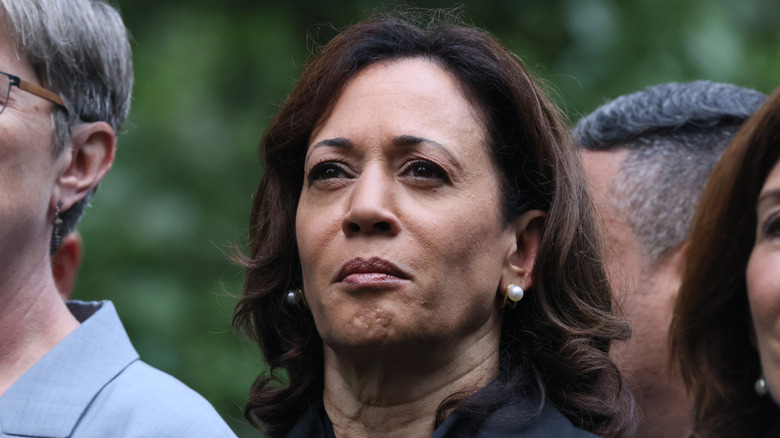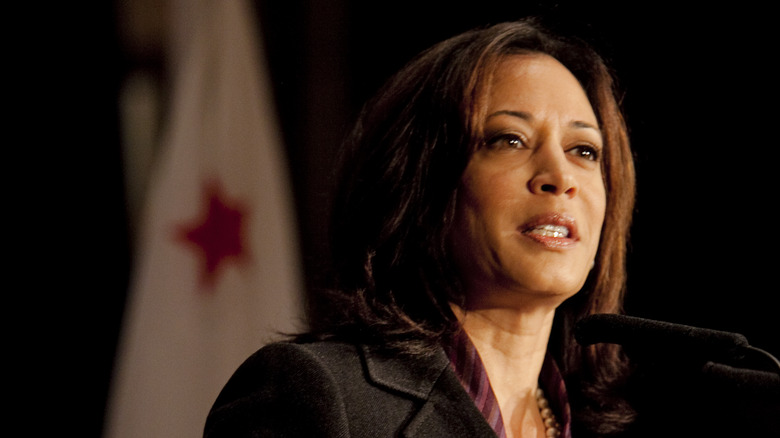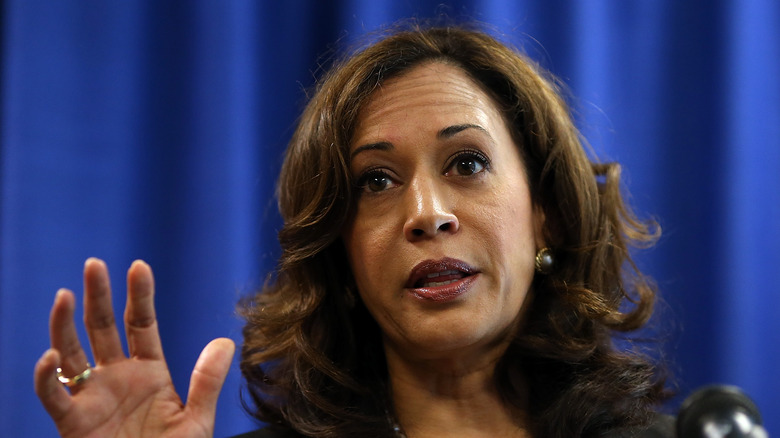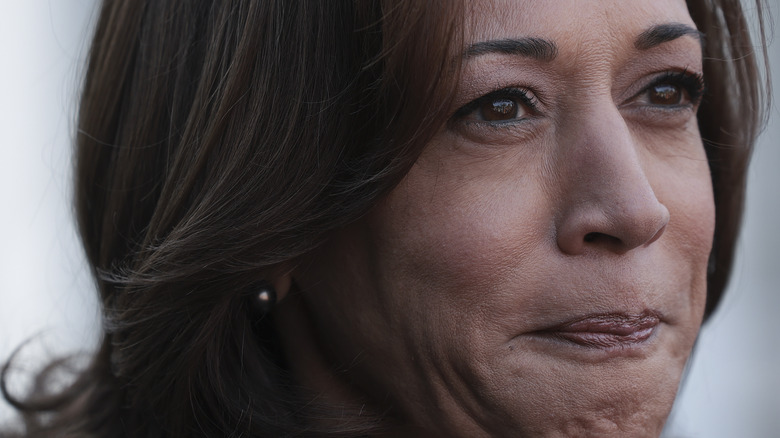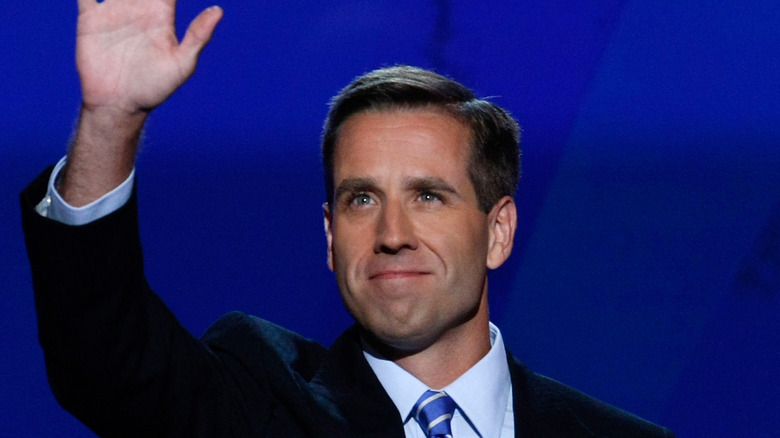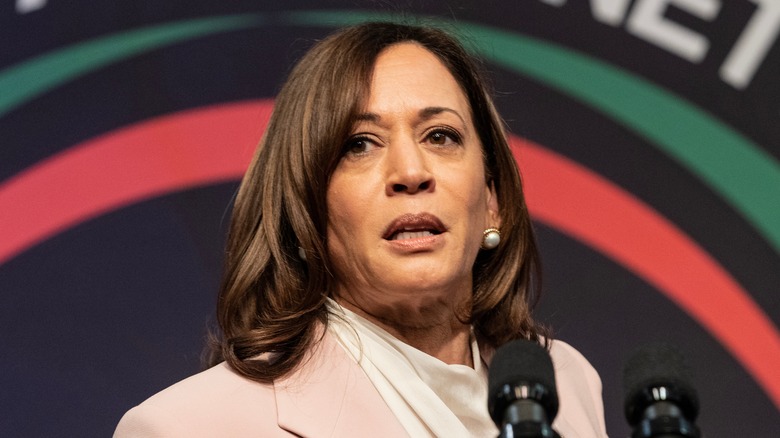The Tragedy Of Kamala Harris Explained
Kamala Harris has had an astonishing rise in the world of American politics. Born in Oakland in 1964 to intellectual parents who were both prominent activists in the Civil Rights movement, Harris, who is of Afro-Jamaican and Indian descent, grew to understand the importance of activism, civil duty, and social change from an early age. Inspired by the life work of inspirational Black figures such as Huey P. Newton, Martin Luther King. Jr. and Harriet Tubman, she followed her parents into higher education, earning a B.A. in political science and economics as well as a law degree.
With the support of her parents, she soon made her may to the role of attorney general, a role she excelled in. First as a deputy district attorney in Oakland, then attorney general of California, she led some high-profile cases including the overturning of Proposition 8, which banned same-sex marriage. She rose to the rank of Senator in 2016, becoming the first American and second Black woman to do so. She ran successfully for Vice President alongside Joe Biden in 2020, becoming the first female VP, and first person of African and South Asian descent to serve in the role.
Her achievements are undeniable, and it is true that much of her success derives from her loving and supportive background. However, Harris has also suffered some setbacks in her life, including some heartbreaking tragedies that affected her deeply. Here are the details.
Her parents divorced when she was young
Kamala Harris's parents met as students at the University of California, Berkeley, in the early 1960s. Her mother, Shyamala Gopalan, was an Indian student working toward a master's degree in nutrition and endocrinology, while her Jamaican-American father, Donald Harris, studied economics. Both would become distinguished in their fields, with Gopalan becoming a cancer researcher and Donald a professor of economics. In their student years, both were heavily involved in the university's Afro-American Association during an important period for Black intellectualism and activism.
The influence of Harris' parents in her early years was immense and certainly shaped the career that she would go on to achieve. But sadly, her childhood was shaken by her parents' divorce, which occurred when she was just 7 years old. Donald's professorship meant teaching in various different universities, and his peripatetic profession soon took a strain on his family.
Harris has noted that her parents were young when they came together, and may have lacked the maturity to work through their problems. Though she spent most of her time after that in the custody of her mother, she would visit her father occasionally on weekends and holidays. Harris recalled that the relationship between her parents initially soured after their separation, and she was worried that her mother would be unwilling to attend her graduation alongside her father. As Donald became less of a figure in Harris's life, friends of her mother stepped in to help raise her and her sisters, as their mother worked long hours.
Her mother's career was affected by discrimination
Shyamala Gopalan and Donald Harris were making great strides in academia at a time of social upheaval when discrimination was rife in many walks of life. Their engagement with Civil Rights activism reflected their awareness of the social injustice they both experienced as people of color in mid-20th century America.
Gopalan came from a prosperous Tamil Brahmin family in India, and though she had gone to college in New Delhi she had ambitions beyond that which could be supported by women's education in the country at the time. Gender discrimination generally held that Tamilian women lived as homemakers, while work, including work in academia, was reserved for men. Thankfully, Gopalan's own father was unusually progressive and willed her to study in America just as he had done.
Gopalan's ambition never left her, and as a cancer researcher, she is credited with having a direct hand in a number of medical breakthroughs which have potentially saved countless lives. However, despite her academic prowess she came to believe that even academic institutions in the U.S. held her back as a result of discrimination, according to Biography. As a result, Kamala and her sister, Maya, later relocated to Montreal with their mother, who took on research there, while their father worked at Stanford. Such realities faced by hard-working people of color later became central to Harris' political worldview.
The heartbreaking death of Kamala Harris' mother
Over the course of her career, Shyamala Gopalan established herself as a leading figure in the field of cancer research. She was also a formidable matriarch, with her daughters remembering her as a loving but strict parent, who had been toughened by the experience of being an Indian woman facing discrimination in American academia. She was also caring of Kamala Harris' school friends, with one, Wanda Kagan, telling CBC News on Harris' Vice Presidential win how Gopalan had taken her when her home life became unsafe, allowing her to finish her schooling.
Sadly, Gopalan was not able to witness the heights to which her daughter would ascend in U.S. politics and the barriers she would break down. On February 11, 2009, Gopalan died at 70 of colon cancer. Her death was felt keenly in the field of medicine, with Breast Cancer Action publishing a warm obituary of her, outlining her scientific achievements.
In 2022 at an event promoting the government's moonshot initiative to improve cancer research funding, she shared her experience. "After a lifetime working to end cancer, cancer ended my mother's life," Harris said," I will never forget the day that she sat my sister and me down and told us she had been diagnosed with colon cancer. It was one of the worst days of my life and an experience that sadly, millions and millions of people in our country have had," later adding, "I miss my mother every day. And I carry her memory with me wherever I go" (via The Independent).
The heartbreaking death of Beau Biden
Kamala Harris' relationship with President Joe Biden is well documented. The two shared the Democratic ticket in the 2020 presidential election, successfully ousting former reality TV show host and President Donald Trump from office after just one term. Their campaign material understandably portrayed Biden and Harris as being both politically simpatico and on good terms as friends. However, that was not always the case. In fact, Harris' ascension to be Biden's running mate came at the end of a long audition and vetting process, with Biden's camp initially distrustful of the senator due to attacks she had made against him during the Democratic primaries over his lack of support for desegregation policies in the 1970s.
The two were bound together personally, however, through their love of Beau, Biden's son who was also one of Harris' close friends. Tragically, Beau died in 2015 of brain cancer at the age of 46, a heartbreaking loss for both Biden and Harris. Harris has recalled how Beau and she would support each other through difficult moments in their careers. According to The Guardian, she wrote of him in her memoir, saying he was an "incredible friend and colleague ... There were periods, when I was taking heat, that Beau and I talked every day, sometimes multiple times a day. We had each other's backs."
Kamala Harris' route to the presidency is difficult
Much has been made of President Joe Biden's advanced age during his campaign for a second term in the White House, with commentators pointing out that he would be 86 by the end of his second term were he to win. However, such speculation about Biden's age is nothing new. When he was voted into office back in 2020, Biden was just turning 78, and part of Harris' appeal as a potential running mate was that she represented a younger and more modern side of his administration. More importantly, for many analysts, her presence suggested that Biden was possibly planning on serving only a single term on account of his age, and would then hand over the reins to his VP.
However, things have not transpired that way. In April 2023, Biden announced he was running for re-election, and in the months since scrutiny of his age and suitability for the role has grown to the point at which critics are suggesting he must step down and allow another figure to claim the Democratic domination. If such happened, Harris, who has enjoyed a groundswell of support, would not necessarily be his replacement. Instead, a wide range of potential candidates would likely emerge, with Harris' allies fretting that there would be a good chance she would be passed over for another candidate, effectively reversing her ascension toward the highest office in the land.
